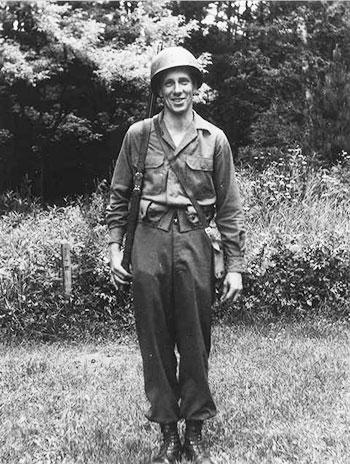
By Christine Baldwin, AFRH-W Librarian
Richard Baker (PFC) was born in Philadelphia, Pennsylvania July 16, 1921. He joined the Army August 13, 1942 at 21 years of age and his initial assignment was the 4th Infantry District, 12th Regiment, 3rd Battalion, Company M. He spent the first year and a half in the states training for combat. Most of that time was in Camp Gordon Florida, Camp Wheeler, Georgia and Fort Dix, New Jersey.
He left the port of New York on January 18, 1944 on the transport ship "George Washington", and arrived in Liverpool, England 11 days later. He was later transferred to Plymouth, England where he spent the next six months training for the invasion.
The invasion of Normandy was supposed to take place on June 5, but the weather was too bad. He landed and arrived at Utah Beach on D-Day (June 6, 1944). The weather was still very bad. Many of the men were sea-sick, cold and wet. Higgins Landing Craft carried 30 men, and the Navy dropped them several miles from where we were supposed to land. Their leader was Brig. Gen. Theodore Roosevelt Jr., who had decided the war would start right where they had landed.
Their objective was to link up with the 101st Airborne Division, and secure the Port of Cherbourg, so that supplies could be shipped into France. The assault on Utah Beach was relatively easy compared to Omaha Beach. His unit quickly found themselves in a struggle to stay alive with the Germans as they fought day and night throughout the hedgerows to take the Port of Cherbourg. By the time the port was taken on June 25, the 4th Division lost over 5,000 men (killed or wounded). On June 11th, Richard was one of those of those wounded. He was out of the battle for a couple of weeks, and then sent back to the 4th Division again and wounded for a second time on August 7th.
On August 25th, he was with the first division to enter Paris. The German Army had already retreated except for a few snipers. The men, women, and children showered troops with hand baked goodies, kisses, ribbons, and wine. It was a jubilant day for the men of the 4th division. They spent the night in a park near the Notre Dame Cathedral. The MPs had a hard time keeping all the men in town. The next day, they were on the go again and continued their pursuit for the German Army across France and Belgium.
In November 1944, and into December, they fought in the Hurtgen Forest. Fighting throughout the bloody forest, there was a tree top explosion that created collateral damage. The grounds were frozen so they couldn't dig underground for protection. Snow also covered booby traps and mines so they couldn't tell where they were. Bitter and cold they lacked proper footwear, and they ended up with frostbite on their feet.
The 12th Regiment position became known as "Purple Heart Hollow" and "Death Valley” which were derived from the bitter bloody struggle in the gloomy Hurtgen Forest. By December 7, 1944, the 12th Infantry Regiment had accomplished its mission, and cleared its portion of the Hurtgen Forest. They were then sent to a quiet sector in Luxembourg to rest and rebuild their strength.
After Hurtgen, Luxembourg was like heaven. Richard was in a warm and dry house where there were hot showers and good food. The men rested and enjoyed the local Inn, but the rest and relaxation was not destined for long. For the epic defense of Luxembourg, the 12th Infantry Regiment was awarded the Distinguished Unit Citation.
December 16, 1944 The Battle of the Bulge began, and ended January 25, 1945. Three powerful German armies plunged headlong into the rugged mountains and dense forests of the Ardennes determined to break the American line of defense, and trap the allied forces in Belgium and Luxembourg. They met fierce opposition the minute they engaged the thinly spread American line and paid a heavy price for every inch of the ground gained. The battle raged for three consecutive days until powerful allied reinforcements arrived to join the fighting and keep the Germans from breaking through. The fighting continued for four weeks in bitter cold and snow, and all the Germans could accomplish was to put a small bulge in the line. At the end, the line held firm and the Germans suffered a terrible loss of men, tanks, and planes. 500,000 Germans lost their lives trying to win the war.
The 4th Infantry Division continued to fight relentlessly until the Germans were brought to their knees and the war in Europe ended on May 8, 1945. The eleven months of battle took its toll on the 4th ID. They had 35,545 total casualties both killed and wounded.
Richard is now at AFRH-W.
- Log in to post comments
